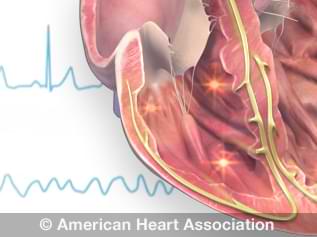Reasons for Continual Irregular Heart Rate

ECG strip showing a normal heartbeat

ECG strip showing tachycardia
Tachycardia refers to a heart rate that's too fast. How that's defined may depend on your age and physical condition.
Generally speaking, for adults, a heart rate of more than 100 beats per minute (BPM) is considered too fast.

View an animation of tachycardia.
Types of tachycardias
Atrial or Supraventricular Tachycardia (SVT)
Atrial or supraventricular tachycardia (SVT) is a fast heart rate that starts in the upper chambers of the heart. Some forms of this particular tachycardia are paroxysmal atrial tachycardia (PAT) or paroxysmal supraventricular tachycardia (PSVT).
With atrial or supraventricular tachycardia, electrical signals in the heart's upper chambers fire abnormally. This interferes with electrical impulses coming from the sinoatrial (SA) node, the heart's natural pacemaker.
The disruption results in a faster than normal heart rate. This rapid heartbeat keeps the heart's chambers from filling completely between contractions, which compromises blood flow to the rest of the body.
A profile for atrial or SVT
In general, those most likely to have atrial or supraventricular tachycardia are:
- Children (SVT is the most common type of arrhythmia in kids)
- Women, to a greater degree than men
- Anxious young people
- People who are physically fatigued
- People who drink large amounts of coffee (or caffeinated substances)
- People who drink alcohol heavily
- People who smoke heavily
Atrial or SVT is less commonly associated with heart attack or serious mitral valve disease.
Symptoms and complications
Some people with atrial or supraventricular tachycardia may have no discernible symptoms. Others may experience:
- Fainting (syncope)
- Lightheadedness or dizziness
- Rapid heartbeat or palpitations
- Fluttering in the chest
- Bounding pulse
- Chest pressure, tightness or pain (angina)
- Shortness of breath
- Fatigue
In extreme cases, those suffering with atrial or SVT may also experience:
- Unconsciousness
- Cardiac arrest
Treatment for Atrial or SVT
If you have atrial or SVT, it's possible that you won't need treatment.
But if the episodes are prolonged, or recur often, your doctor may recommend treatment, including:
- Carotid sinus massage: A healthcare professional can apply gentle pressure on the neck, where the carotid artery splits into two branches.
- Pressing gently on the eyeballs with eyes closed. Caution: This procedure should be supervised carefully by a healthcare physician.
- Valsalva maneuver: This consists of holding your nostrils closed while blowing air through your nose.
- Using the dive reflex: The dive reflex is the body's response to sudden immersion in water, especially cold water.
- Sedation
- Cutting down on coffee or caffeinated substances
- Cutting down on alcohol
- Quitting tobacco use
- Getting more rest
In patients with Wolff-Parkinson-White Syndrome, medications or ablation may be needed to control paroxysmal supraventricular tachycardia (PSVT).
Sinus Tachycardia
Sinus tachycardia is a normal increase in the heart rate. In this condition, the heart's natural pacemaker, the sinoatrial (SA) node, sends out electrical signals faster than usual.
The heart rate is faster than normal, but the heart beats properly.
Causes of sinus tachycardia
A rapid heartbeat may be your body's response to common conditions such as:
- Anxiety
- Fright
- Severe emotional distress
- Strenuous exercise
- Fever
- Some medicinal and street drugs
Other, less common causes may include:
- Anemia
- Increased thyroid activity
- Heart muscle damage from heart attack or heart failure
- Severe bleeding
Approach to treatment
Your doctor should consider and treat the cause of your sinus tachycardia, rather than just treating the condition. Simply slowing the heart rate could cause more harm if your rapid heartbeat is a symptom of a more serious or long-term problem.
Ventricular Tachycardia
Ventricular tachycardia is a fast heart rate that starts in the heart's lower chambers (ventricles). This type of arrhythmia may be either well-tolerated or life-threatening, requiring immediate diagnosis and treatment.
The seriousness depends largely on whether other cardiac dysfunction is present and on the degree of the ventricular tachycardia.
Explaining the problem
In cases of ventricular tachycardia, electrical signals in the heart's lower chambers fire abnormally. This interferes with electrical impulses coming from the sinoatrial (SA) node, the heart's natural pacemaker.
The disruption results in a faster than normal heart rate. This rapid heartbeat keeps the heart's chambers from filling completely between contractions, which compromises blood flow to the rest of the body.
Causes of ventricular tachycardia
Ventricular tachycardia is most often associated with disorders that interfere with the heart's electrical conduction system. These disorders can include:
- Lack of coronary artery blood flow, depriving oxygen to heart tissue
- Cardiomyopathy distorting the heart's structure
- Medication side effects
- Illicit drugs such as cocaine
- Sarcoidosis (an inflammatory disease affecting skin or body tissues)
Range of symptoms
Symptoms for ventricular tachycardia vary. Common symptoms include:
- Dizziness
- Palpitations
- Shortness of breath
- Nausea
- Lightheadedness
- Falling unconscious
- Cardiac arrest, in extreme cases
Treatment options
The cause of your ventricular tachycardia will inform your treatment options. Possible approaches include:
- Medication
- Radiofrequency ablation
- Surgery
- Immediate electrical defibrillation, in extreme cases
Printable Arrhythmia Information Sheets
garciahavendecked1996.blogspot.com
Source: https://www.heart.org/en/health-topics/arrhythmia/about-arrhythmia/tachycardia--fast-heart-rate
Posting Komentar untuk "Reasons for Continual Irregular Heart Rate"